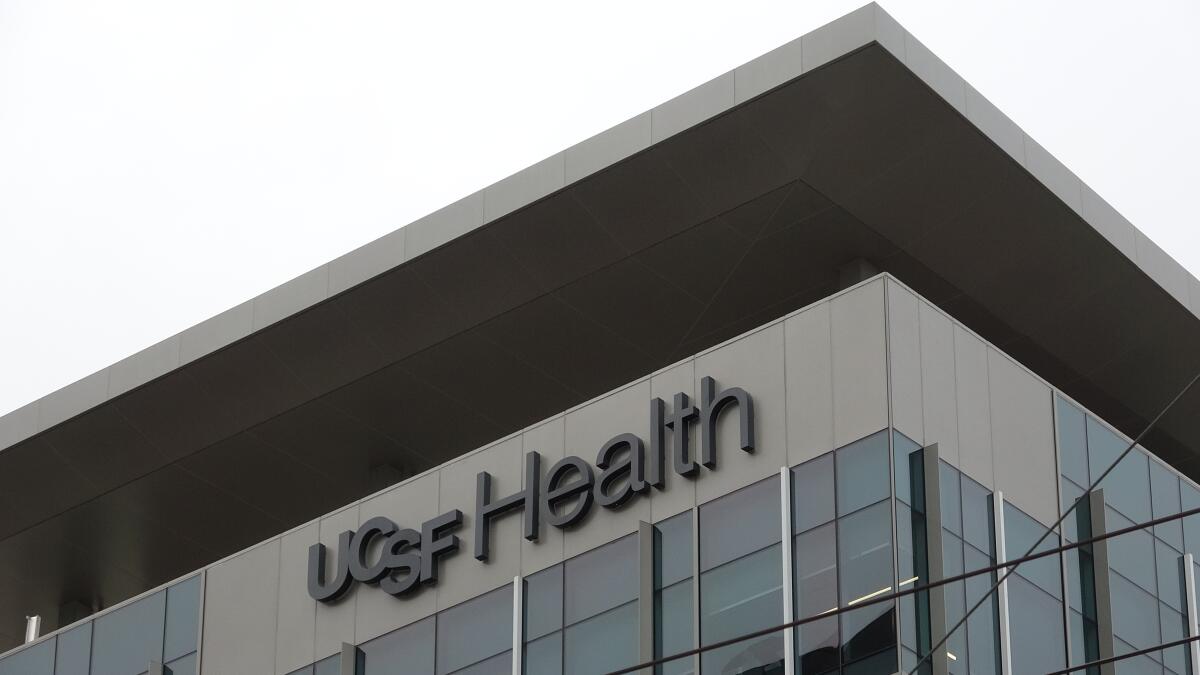UC betrays its values when it partners with Catholic hospitals that restrict care

- Share via
More than 500 abortion restrictions have been introduced in state legislatures this year. Laws banning gender-affirming care for transgender young people are sweeping the nation. These attacks make Californians feel lucky to live in a state that prides itself as a leader in reproductive and LGBTQ+ rights.
Yet at a moment when we need to be standing up for access to these essential services, the University of California, where I work as an obstetrician/gynecologist and researcher, is considering formalizing and expanding partnerships with facilities that prohibit UC doctors, nurses, residents and medical and nursing students from providing this exact care.
The UC Health Centers enter into agreements with outside providers for a variety of reasons — to bring UC specialty expertise into new settings, for example, or to increase the number of sites where UC patients can receive care and expand training opportunities.
All six UC Health Centers have partnered with some facilities that put harmful restrictions on reproductive and LGBTQ+ care. Most of these restrictive facilities are affiliated with the Catholic Church. What they will allow has nothing to do with medical evidence or what patients need or want; nor are their rules based on a lack of available equipment or expertise. The hospitals just refuse to provide the care as a matter of policy.
On Wednesday, the UC regents will consider whether to allow such partnerships on a permanent basis. They should draw a firm line to prevent policy-based restrictions on UC employees and trainees and ensure that we can provide reproductive and gender-affirming care to all the patients we treat.
The objectionable contracts prohibit UC clinicians from doing such things as inserting an IUD, providing emergency contraception for sexual assault victims, performing a tubal ligation during a Caesarean delivery and treating miscarriage or possibly even an ectopic pregnancy.
Delaying or denying this kind of time-sensitive, necessary care carries serious consequences. A woman who testified at a state Senate hearing in April — identified by her first name, Maddie — said she endured hours of pain, complicated by internal bleeding, awaiting emergency surgery for a ruptured ectopic pregnancy at St. Joseph Hospital in Eureka, Calif. Her care, she told the senators, “was significantly delayed due to the restrictive policies” related to abortion at the hospital. Evan Minton, a transgender man seeking care at Mercy San Juan Medical Center, in the Sacramento area, had his long-planned hysterectomy canceled the day before his surgery after a nurse realized he was trans. The ACLU has filed a lawsuit on Minton’s behalf.
Neither example involved a UC physician or trainee, but both hospitals are Catholic institutions, and these are the types of situations UC personnel will face if the university goes forward with restrictive contracts.
Denying the standard of care to patients such as Maddie and Minton is discriminatory, causes undue emotional distress and at worst can endanger their lives. As with all inequities in our medical system, the burdens of these restrictions will fall most heavily on LGBTQ+ people, people of color and those with low incomes or living in rural areas. Holding UC medical staff and students to these policies is a clear contradiction of the values that draw so many people to the University of California for healthcare and for their educations.
People in favor of these partnerships argue that they’re necessary for UC resources to reach underserved patients. They are satisfied with parts of the contracts that say that doctors like me, in these outside settings, can still counsel patients and prescribe as I see fit, although to follow my counsel, even in urgent situations, patients would have to transfer to another hospital. That’s simply not good care.
By agreeing to these deals, UC is essentially telling some of our patients that restricted care is the best they can hope for. Some UC patients can have access to the highest standard of care based on medical evidence and their needs, while others must get substandard care. UC has not fully explored alternatives that would do much more to serve underserved populations such as expanding partnerships with county hospitals.
The university’s dealmaking has been done behind closed doors, with limited public information on the impact of these contracts on preventative care and urgent care. I was one of more than 2,500 UC community members — doctors, nurses, trainees, students and staff — who signed an open letter expressing their opposition to agreeing to discriminatory restrictions. Members of the California congressional delegation, the California Legislative LGBTQ and Women’s Caucuses and openly LGBTQ+ elected officials have also raised the alarm. Yet there has been a troubling lack of transparency and no serious reckoning with the ways these policies put our patients at risk.
I’m proud of the high-quality, inclusive care we provide at UC facilities, free from medically unnecessary restrictions. Every Californian has the right to that standard of care. The regents must uphold our commitments to our patients’ safety and well-being and prevent medically unsound restrictions on UC healthcare providers, students and patients.
Daniel Grossman is a professor in the obstetrics, gynecology and reproductive sciences department at UC San Francisco and the director of Advancing New Standards in Reproductive Health.
More to Read
A cure for the common opinion
Get thought-provoking perspectives with our weekly newsletter.
You may occasionally receive promotional content from the Los Angeles Times.






